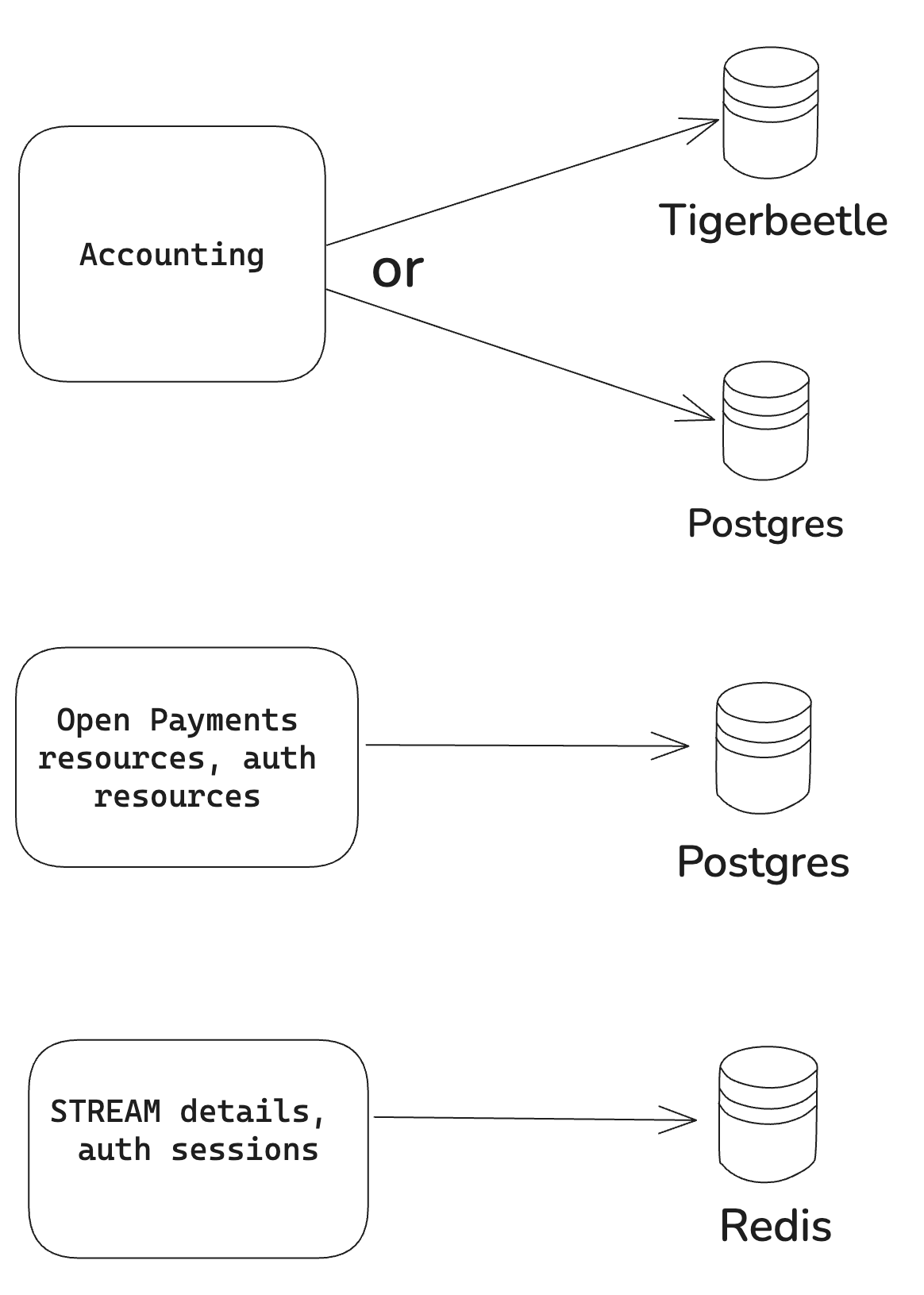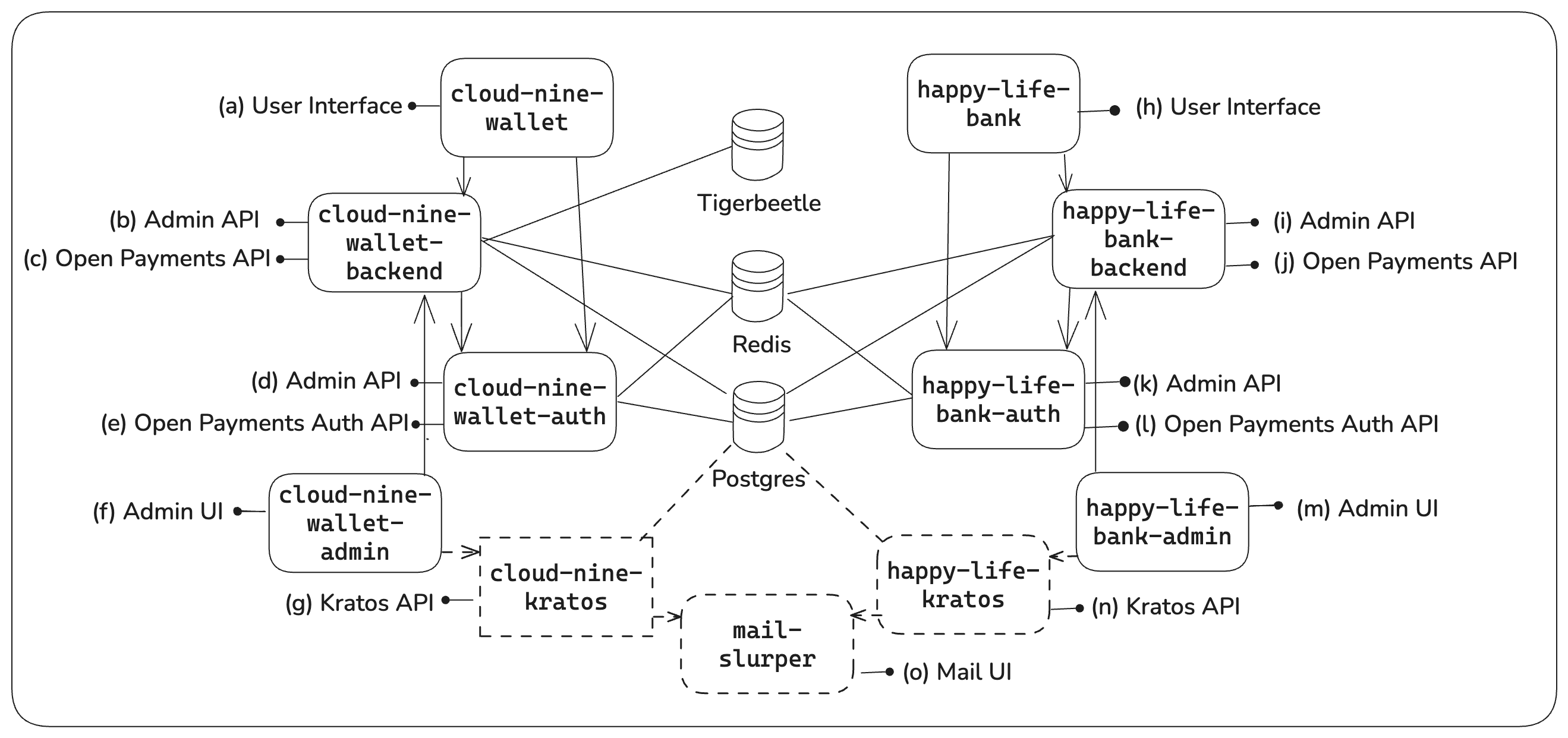Overview
The Local Playground provides a suite of packages that, together, mock an account servicing entity that has deployed Rafiki. It exposes an SPSP endpoint, the Open Payments APIs with its required GNAP auth endpoints to request grants, a STREAM endpoint for receiving Interledger packets, and the Rafiki Admin app to view and manage each Rafiki instance.
This suite of packages includes:
| Package name | Services |
|---|---|
backend |
|
auth | GNAP auth server |
mock-account-servicing-entity | mocks an account servicing entity |
frontend | Remix app to expose a UI for Rafiki admin management via interaction with the Backend Admin APIs |
These packages depend on the following databases:

The Local Playground comes with containerized versions of the Rafiki packages and three pre-configured docker-compose files. Cloud Nine Wallet and Happy Life Bank will start two mock account servicing entities with their respective Rafiki backend and auth servers. They automatically peer, and two to three user accounts are created on both of them. The third file is for Cloud Ten Wallet which is a mock ASE representing a tenant in a multi-tenant environment. See Enabling multi-tenancy for more information.
This environment will set up a playground where you can use the GraphQL Admin APIs and the Open Payments APIs.
To spin up the Local Playground install the following software on your machine:
- A Rafiki local environment setup
- The Docker platform.
- An open-source API client Bruno
The local environment can be set up using either TigerBeetle or Postgres as the accounting database.
This option enables the primary instance (Cloud Nine Wallet) to utilize TigerBeetle for its accounting database. The secondary instance (Happy Life Bank) will always run Postgres as its accounting database.
To run the local environment with TigerBeetle, execute the following command from the root of the project:
pnpm localenv:compose upIf you want the primary instance (Cloud Nine Wallet) to use Postgres as the accounting database instead of TigerBeetle, you must use the psql variant of the localenv:compose command as follows:
pnpm localenv:compose:psql upThe Local Playground can be configured to simulate a multi-tenant environment. In this configuration, Cloud Nine Wallet and Happy Life Bank are configured as separate operators, while Cloud Ten Wallet is configured as a tenant of Cloud Nine Wallet.
To run the local environment with multi-tenancy enabled, execute the following command from the root of the project:
pnpm localenv:compose:multitenancy upThe local environment consists of a primary and secondary Rafiki instance, each with its docker-compose file (Cloud Nine Wallet , Happy Life Bank ). The primary Cloud Nine Wallet docker-compose file (./cloud-nine-wallet/docker-compose.yml) includes the primary Rafiki backend and auth services, as well as the required data stores, which include TigerBeetle (if enabled), Redis, and Postgres. The primary instance contains all of the necessary components so that it can run independently.
The secondary Happy Life Bank docker-compose file (./happy-life-bank/docker-compose.yml) includes only the Rafiki services, not the data stores. It uses the data stores created by the primary Rafiki instance, so it can’t be run independently. The pnpm localenv:compose up command starts both the primary and secondary instances.
The following components are made available via the Local Playground:
Mock account servicing entity 1 - Cloud Nine Wallet
Section titled “Mock account servicing entity 1 - Cloud Nine Wallet”| Label | Component | URL |
|---|---|---|
| a | User Interface | http://localhost:3030 |
| b | Backend Admin API | http://localhost:3001/graphql |
| c | Open Payments API | http://localhost:3000 |
| d | Auth Admin API | http://localhost:3003/graphql |
| e | Open Payments Auth API | http://localhost:3006 |
| f | Rafiki Admin UI | http://localhost:3010 |
| g | Kratos API - disabled by default | http://localhost:4433 |
Mock account servicing entity 2 - Happy Life Bank
Section titled “Mock account servicing entity 2 - Happy Life Bank”| Label | Component | URL |
|---|---|---|
| h | User Interface | http://localhost:3031 |
| i | Backend Admin API | http://localhost:4001/graphql |
| j | Open Payments API | http://localhost:4000 |
| k | Auth Admin API | http://localhost:4003/graphql |
| l | Open Payments Auth API | http://localhost:4006 |
| m | Rafiki Admin UI | http://localhost:4010 |
| n | Kratos API - disabled by default | http://localhost:4432 |
| Label | Component | URL |
|---|---|---|
| o | Mail UI - disabled by default | http://localhost:4436 |
| Component | URL |
|---|---|
| Postgres Server | http://localhost:5432 |
Manage and view information about the Rafiki instance(s) through the Rafiki Admin application. Rafiki Admin is a Remix app for querying info and executing mutations against the Rafiki Backend Admin API.
- Cloud Nine Wallet -
http://localhost:3010 - Happy Life Bank -
http://localhost:4010
We have secured access to Rafiki Admin using Ory Kratos ; however, in our local playground setup we’ve chosen to disable user authentication for easier development and testing interactions.
Navigate to localhost:3030 to view the accounts on Cloud Nine Wallet.
Select an account name to view a list of transactions.
Debuggers for the services are exposed on the following ports:
| Services | IP and Port |
|---|---|
| Cloud Nine Backend | 127.0.0.1:9229 |
| Cloud Nine Auth | 127.0.0.1.9230 |
| Happy Life Bank Backend | 127.0.0.1:9231 |
| Happy Life Bank Auth | 127.0.0.1:9232 |
- Go to chrome://inspect
- Select Configure and add the IP addresses and ports detailed above
- Start the docker containers
- Select Inspect on the service you want to debug to open the Chromium debugger.
You can either trigger the debugger by adding debugger statements in the code and restarting the Docker containers or by adding breakpoints directly to the Chromium debugger after starting the Docker containers.
To debug with VS Code, add this configuration to your .vscode/launch.json:
{ "name": "Attach to docker (cloud-nine-backend)", "type": "node", "request": "attach", "port": 9229, "address": "localhost", "localRoot": "${workspaceFolder}", "remoteRoot": "/home/rafiki/", "restart": true},The localRoot variable will depend on the location of the launch.json file relative to Rafiki’s root directory.
For more ways to connect debuggers, refer to the Node JS docs for debugging.
To shut down your local instance, run the following commands:
# tear downpnpm localenv:compose down
# tear down and delete database volumespnpm localenv:compose down --volumes
# tear down, delete database volumes and remove imagespnpm localenv:compose down --volumes --rmi allThe following are the most commonly used commands:
| Description | Command |
|---|---|
| Show all merged config (with TigerBeetle) | pnpm localenv:compose config |
| Start (with TigerBeetle) | pnpm localenv:compose up |
| Start (with TigerBeetle) detached | pnpm localenv:compose up -d |
| Down (with TigerBeetle) | pnpm localenv:compose down |
| Down and remove volumes (with TigerBeetle) | pnpm localenv:compose down --volumes |
| Down and remove volumes (with TigerBeetle) and images | pnpm localenv:compose down --volumes --rmi all |
| Show all merged config (with Postgres) | pnpm localenv:compose:psql config |
| Build all the containers (with TigerBeetle) | pnpm localenv:compose build |
| Start (with Postgres) | pnpm localenv:compose:psql up |
| Start (with Postgres) detached | pnpm localenv:compose:psql up -d |
| Down (with Postgres) | pnpm localenv:compose:psql down |
| Down (with Postgres) and remove volumes | pnpm localenv:compose:psql down --volumes |
| Build all the containers (with Postgres) | pnpm localenv:compose:psql build |
| Start with local admin auth enabled (this is disabled by default) | pnpm localenv:compose:adminauth up |
The Open Payments APIs can be interacted with using the Bruno collection (resource server endpoints and auth server endpoints). To interact with the Open Payments APIs using Bruno, you must:
- Load the collection into Bruno by selecting Open Collection.
- Navigate to
/rafiki/bruno/collections/Rafikion your machine and select Open. - Furthermore, you need to either load the Local Environment or the Remote Test Network Environment.
The Examples folder in the Bruno collection includes an Open Payments example that can be executed in the following sequence:
sequenceDiagram
participant B as Bruno client
participant SW as Sender's wallet
participant RW as Recipient's wallet
participant AS as Authorization server
participant IdP as Identity provider
B->>SW: 1. GET wallet address
SW-->>B: 200 OK (authServer URL)
B->>RW: 2. GET wallet address
RW-->>B: 200 OK (authServer URL)
Note over B,AS: Non-interactive grant for incoming payment resource
B->>AS: 3. POST grant request (incoming-payment)
AS-->>B: 200 OK (accessToken)
B->>RW: 4. POST /incoming-payments
RW-->>B: 201 Created (incomingPaymentId)
Note over B,AS: Non-interactive grant for quote resource
B->>AS: 5. POST grant request (quote)
AS-->>B: 200 OK (accessToken)
B->>SW: 6. POST /quotes
SW-->>B: 201 Created (quoteId)
Note over B,AS: Interactive grant required for outgoing payment resource
B->>AS: 7. POST grant request (outgoing-payment)
AS-->>B: 200 OK (redirect_uri)
rect rgb(240, 240, 240)
Note over B,AS: Interactive authorization
User interaction required to obtain consent
B->>IdP: Redirect for user consent
IdP-->>B: User consents
B->>AS: 8. POST /continue/{continueId}
end
AS-->>B: 200 OK (accessToken)
B->>SW: 9. POST /outgoing-payments
SW-->>B: 201 Created (outgoingPaymentId)
B->>SW: 10. GET /outgoing-payments/{outgoingPaymentId}
SW-->>B: 200 OK
The sequence of steps outlined below corresponds to the interactions depicted in the diagram above:
- Requests the sender’s wallet address
- Requests the receiver’s wallet address
- Requests a grant to create an incoming payment on the receiver’s account
- Creates an incoming payment on receiver’s account
- Requests a grant to create and read a quote on the sender’s account
- Creates a quote on the sender’s account
- Requests a grant to create and read an outgoing payment on the sender’s account
- Continues the grant request
- Creates an outgoing payment on the sender’s account
- Fetches the outgoing payment on the sender’s account
In addition to using Rafiki Admin to interact with the Admin APIs, you can also use the Apollo Explorer on localhost:3001/graphql and localhost:4001/graphql for Cloud Nine Wallet and Happy Life Bank, respectively, and via the Bruno collection. The Bruno collection is configured to use the local environment’s default endpoints.
Every wallet address also serves as an SPSP endpoint. A GET request with an Accept header application/spsp4+json will return an SPSP response with STREAM connection details. The following example uses http://localhost:3000/accounts/gfranklin as the SPSP endpoint.
GET http://localhost:3000/accounts/gfranklin HTTP/1.1Host:backendAccept:application/spsp4+json
HTTP/1.1 200 OKConnection:keep-aliveContent-Length:220Content-Type:application/spsp4+jsonDate:Thu, 23 Feb 2023 13:07:24 GMTKeep-Alive:timeout=5
{ "destination_account": "test.rafiki.viXmy1OVHgvmQakNjX1C6kQM", "receipts_enabled": false, "shared_secret": "Rz_vudcg13EPs8ehL2drvZFJS1LJ4Y3EltOI60-lQ78"}TigerBeetle container exists with code 137
Section titled “TigerBeetle container exists with code 137”There is a known issue when running TigerBeetle in Docker. The container exits without logs and simply shows error code 137. To fix this, increase the Docker memory limit. If you run the local Docker playground on a Windows machine via the Windows Subsystem for Linux (WSL), you can increase the memory limit by configuring your .wslconfig file.
